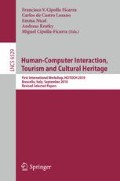Abstract
The most important event following the establishmenet of the Internet network was the Web introduced by Tim Berners-Lee. Websites give their owners features that allow sharing with which they can publish their content with users and visitors. In the last 5 years, we have seen some changes in the use of web. Users want to participate in content sharing and they like to interact with each other. This is known as Web 2.0. In the last year, Web 2.0 has reached maturity and now we need a smart web which will be accordingly be called Web 3.0. Web 3.0 is based on semantic web definition. Changing the way of using the web has had a clear impact on E-Tourism and its development and also on business models. In this paper, we review the definitions and describe the impacts of web evolution on E-Tourism.
Access this chapter
Tax calculation will be finalised at checkout
Purchases are for personal use only
Preview
Unable to display preview. Download preview PDF.
References
Orr. B.: Parsing the Meaning of Web 2.0, ABA Banking journal (2007), http://www.ababj.com/
Solis, B.: The Conversation Prism v1.0, http://www.theconversationprism.com (2008)
Cooke, M., Buckley, N.: Web 2.0 Social Networks and the Future of Market Research. International Journal of Market Research 50(2), 267–292 (2008)
Dearstyne, B.: Blogs, mashups & wikis. The Information Management journal (July 2007)
Barlow, T.: Web 2.0: Creating a Classroom without Walls. Teaching Science Magazine 54(1), 46–48 (2008)
Berners-Lee, T.: The Evolution of The Internet. Campaign Magazine (2008)
Walmesly, A.: The Whys and Wherefores of Web 3.0. Marketing Magazine (2008)
Tapscott, D.: Grown up digital: How the net generation is changing your world. McGraw-Hill, New York (2009)
Office of Travel and Tourism Industries, US Travel and Tourism Industries: A Year in A Review, US Department of Commerce, International Trade Administration (2009)
Trip Advisor (2010), http://www.tripadvisor.com
Nielsen, J.: Social Media: the next great gateway for content discovery (2009), http://blog.nielsen.com/nielsenwire/online_mobile/social-media-the-next-great-gateway-for-content-discovery/
Author information
Authors and Affiliations
Editor information
Editors and Affiliations
Rights and permissions
Copyright information
© 2011 Springer-Verlag Berlin Heidelberg
About this paper
Cite this paper
Eftekhari, M.H., Barzegar, Z., Isaai, M.T. (2011). Web 1.0 to Web 3.0 Evolution: Reviewing the Impacts on Tourism Development and Opportunities. In: Cipolla Ficarra, F.V., de Castro Lozano, C., Nicol, E., Kratky, A., Cipolla-Ficarra, M. (eds) Human-Computer Interaction, Tourism and Cultural Heritage. HCITOCH 2010. Lecture Notes in Computer Science, vol 6529. Springer, Berlin, Heidelberg. https://doi.org/10.1007/978-3-642-18348-5_17
Download citation
DOI: https://doi.org/10.1007/978-3-642-18348-5_17
Publisher Name: Springer, Berlin, Heidelberg
Print ISBN: 978-3-642-18347-8
Online ISBN: 978-3-642-18348-5
eBook Packages: Computer ScienceComputer Science (R0)

